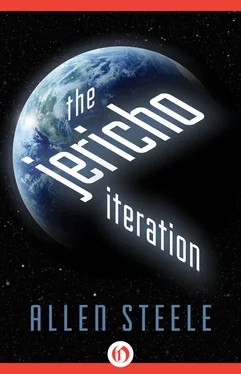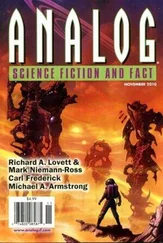Allen Steele - Jericho Iteration
Здесь есть возможность читать онлайн «Allen Steele - Jericho Iteration» весь текст электронной книги совершенно бесплатно (целиком полную версию без сокращений). В некоторых случаях можно слушать аудио, скачать через торрент в формате fb2 и присутствует краткое содержание. Год выпуска: 2013, ISBN: 2013, Издательство: Open Road Media, Жанр: Боевая фантастика, на английском языке. Описание произведения, (предисловие) а так же отзывы посетителей доступны на портале библиотеки ЛибКат.
- Название:Jericho Iteration
- Автор:
- Издательство:Open Road Media
- Жанр:
- Год:2013
- ISBN:978-1-4804-3995-5
- Рейтинг книги:3 / 5. Голосов: 1
-
Избранное:Добавить в избранное
- Отзывы:
-
Ваша оценка:
- 60
- 1
- 2
- 3
- 4
- 5
Jericho Iteration: краткое содержание, описание и аннотация
Предлагаем к чтению аннотацию, описание, краткое содержание или предисловие (зависит от того, что написал сам автор книги «Jericho Iteration»). Если вы не нашли необходимую информацию о книге — напишите в комментариях, мы постараемся отыскать её.
Jericho Iteration — читать онлайн бесплатно полную книгу (весь текст) целиком
Ниже представлен текст книги, разбитый по страницам. Система сохранения места последней прочитанной страницы, позволяет с удобством читать онлайн бесплатно книгу «Jericho Iteration», без необходимости каждый раз заново искать на чём Вы остановились. Поставьте закладку, и сможете в любой момент перейти на страницу, на которой закончили чтение.
Интервал:
Закладка:
We didn’t say much to each other. He was tired, I was tired, and all we wanted to do was to get home, although his wife was expecting him to come through the door while mine … well, I would have to cross that doormat when I got to it. I lay back in the seat, watched the trucks pass by, and contemplated all that had been told to me in Barris’s office.
Mainly, it was a matter of counting all the occasions my bullshit detector had rung a bell.
Ernest Hemingway, the godfather of all self-respecting word pimps, once said that the most valuable gift a writer could have was an unshakable, foolproof bullshit detector. For reporters, that means learning to know instinctively when someone is trying to pull a fast one. I’ve grown a half-decent b.s.-o-meter over a lifetime of writing, and even though it’s neither unshakable nor foolproof, it had rung at least four, maybe five times while I was sitting in the Stadium Club.
Ruby Fulcrum, McLaughlin had said, was the Pentagon code name for an R amp;D project within the Tiptree Corporation’s Sentinel program: the development of a precise space-based tracking system to pinpoint the trajectories of suborbital ICBMs. The first major obstacle had been to develop an energy weapon that could penetrate Earth’s atmosphere without losing too much power, and that had been licked when the whiz kids at Los Alamos had invented a chemical laser that substituted fluorine/deuterium for ordinary hydrogen as its fuel source.
The next big hurdle had been to devise a c-cube system for Sentinel 1. Given the chance that a missile might be fired from a ship or sub off the Atlantic coast, Sentinel’s onboard computer system would have to be virtually autonomous, capable not only of detecting and tracking an ICBM during its boost phase, and thus enabling the satellite to shoot it down before it reentered the atmosphere, but also of differentiating between possible decoy-missiles and real targets. The problem was made even more hairy by the fact that if an SLBM was launched from a vessel just off the Eastern seaboard, Sentinel 1 would have only a few minutes to accurately detect, track, and destroy the missile before its nuclear warhead detonated above Washington or New York.
Richard Payson-Smith had been the leader of the Ruby Fulcrum team, since his scientific background included both high-energy lasers and cybernetics. The team had also included three other scientists: Kim Po, a young immigrant from United Korea who had previously worked with Payson-Smith at Los Alamos; Jeff Morgan, even younger than Kim, who had been recruited straight from MIT to work on the program, and-no surprise here, although I had been careful not to let on-Beryl Hinckley, a former CalTech professor who had recently escaped from academia to pursue a more lucrative career in private industry.
“We knew that Richard had some misgivings about Sentinel when the company assigned him to the program,” McLaughlin had said. “He had a-well, call it a pacifist streak, if you will-but we needed his expertise nonetheless. We thought that, since Sentinel is purely defensive in nature, he would overcome his leftist tendencies. And so it seemed, at least at first …”
But as the project went along and the team gradually managed to overcome the technical hurdles, Payson-Smith’s behavior had become increasingly erratic. His temper became shorter; he began to berate his colleagues over minor mistakes or even for taking time to answer personal phone calls or making dentist appointments in the middle of the week. Payson-Smith managed to calm down after a while, but as he did he also began to voice his objections to Sentinel, calling it a “doomsday machine,” “a Pentagon war wagon,” and so forth. As Ruby Fulcrum’s objectives were gradually achieved and Sentinel 1 inched closer to deployment, Payson-Smith became actively hostile toward the other three members; no one dared venture into his office lest they be subjected to a political harangue. He had also become manic-depressive, sliding into silent fugues that could last for weeks on end.
“Didn’t your company notice?” I had asked. “If the project was that crucial, why didn’t you have him replaced, or at least force him to seek psychiatric-”
“Because, as you said, the project was crucial.” Huygens gave me an arch look: you don’t know what you’re talking about. “The program was on a time-critical basis, so we couldn’t just up and fire him. Where would a replacement come from? How could we get one to fit in with the team at this late stage? We-”
McLaughlin shot a look at Huygens; the PR man shut up. “It was impossible to get Richard to see the staff psychologist,” McLaughlin continued in more patient tones. “When we made appointments for him, he’d find a way to avoid them. He was stubborn and, well …” He raised his hands in helplessness. “We just had to work with him and hope for the best.”
That was the first time my bullshit detector had gone off. Now, upon reflection, I knew why.
First, whatever purpose Payson-Smith had fulfilled in the Ruby Fulcrum team couldn’t have been so critical that Tiptree had been unable to replace him, even in a pinch. However brainy this man was, I hadn’t heard his name mentioned in the same breath as Robert Oppenheimer’s, and they had replaced him, too, way back when. Oppenheimer’s only mistake had been in openly expressing his objections to the atomic bomb, and that was after it was exploded over Japan. No one had ever claimed he was mentally ill, only that he was a suspected commie sympathizer.
If Huygens was telling me the truth, then Payson-Smith should have been canned immediately, for being mentally unhinged and opposed to Sentinel before it was even built, let alone made operational. But they wouldn’t have kept him on the project … and that, I now realized, was why the first alarm had rung.
At the same time this was going on, McLaughlin continued, certain spare parts and lab instruments had turned up missing from the company storerooms; they included various high-quality mirrors, lenses, Pyrex tubes, small carbon dioxide and water tanks, and a portable vacuum pump. The theft of the items had not been detected, it later turned out, because someone had managed to access the company’s computer inventory system and delete their removal from the records. The loss was discovered only when other scientists complained to the company comptroller that they couldn’t find items that had been there last week.
Then, almost exactly one week ago, Kim Po was found dead outside his condominium in Richmond Heights. He had apparently been coming home from a late night at the lab when he was shot just outside the condo’s front door … not by a conventional rifle, but by a laser weapon of some sort, one that had drilled a self-cauterizing hole straight through the back of his head from a parked car. As with John’s murder, no one had heard gunfire, nor had a bullet been recovered from either man’s body.
“We’ll cut to the chase,” Barris said. “Judging from the information Cale has given us and the near identical circumstances of both Dr. Kim and Mr. Tiernan’s murders, it seems as if a high-power laser had been used.”
McLaughlin coughed into his fist. “A CO2 laser rifle, to be exact,” he said. “Not like something you see in movies, of course. It would be extremely large and cumbersome … at least the size of a rocket launcher, in fact … but my people tell me it could produce a beam capable of burning through metal, wood, plastic, just about anything … and that includes flesh and bone.”
He shook his head. “It’s a nasty weapon, probably even more powerful than the one that kid in Chicago used a couple of years ago. Silent, invisible, absolute flat trajectory, almost infinite range. If you had a good infrared sight to go with it, you could fire it through a closed window, provided it was made of nonreflective glass, and hit a target several blocks away. No one would even know where the shot came from.”
Читать дальшеИнтервал:
Закладка:
Похожие книги на «Jericho Iteration»
Представляем Вашему вниманию похожие книги на «Jericho Iteration» списком для выбора. Мы отобрали схожую по названию и смыслу литературу в надежде предоставить читателям больше вариантов отыскать новые, интересные, ещё непрочитанные произведения.
Обсуждение, отзывы о книге «Jericho Iteration» и просто собственные мнения читателей. Оставьте ваши комментарии, напишите, что Вы думаете о произведении, его смысле или главных героях. Укажите что конкретно понравилось, а что нет, и почему Вы так считаете.












